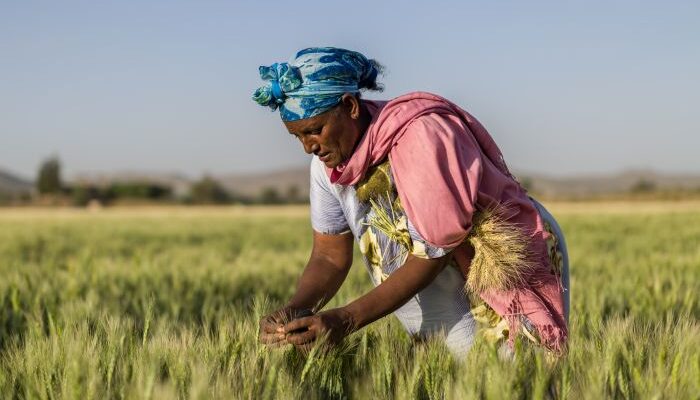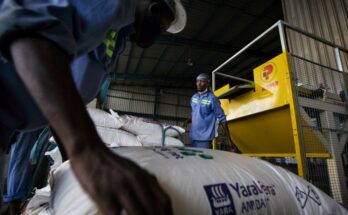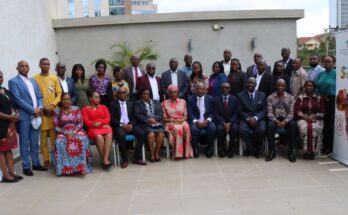Semera, Ethiopia: The African Development Bank Group (AfDB) and the Ethiopian government, in collaboration with the Netherlands, fertiliser company OCP-Africa, and the Global Center on Adaptation (GCA), have initiated an ambitious project aimed at transforming Ethiopia from a wheat importer into a self-sufficient producer and exporter.
The Climate Resilient Wheat Value Chain Development (CREW) Project has a total budget of US$94 million. The African Development Fund (ADF), part of the African Development Bank Group, is providing a US$54 million grant. The Netherlands will contribute US$20 million, while OCP-Africa and the Ethiopian government will each provide US$10 million. Additionally, the GCA will grant US$300,000 through the Africa Adaptation Acceleration Program (AAAP). This programme integrates climate risk assessment and digital adaptation solutions into the wheat value chain, supports capacity building via digital climate advisory services (DCAS) and co-designs digital adaptation solutions for a wheat farmer registration system.
You may also like to read – FAO Food Outlook predicts stability for most food commodity markets in 2024-25
The funding will aid 500,000 smallholder farmer households in Ethiopia’s Afar, Amhara, Oromia, and Somali regions, aiming to boost wheat productivity from three to four tonnes per hectare, resulting in an additional 1.62 million tonnes of wheat. The project also plans to expand irrigation in the lowlands of Afar and Somali regions. Expected to benefit 2.3 million people, half of whom are women, the project will enhance household incomes, create jobs, and strengthen food and nutrition security.
The CREW project comprises two main components. The first focuses on improving wheat farming with climate-friendly methods, including developing better seeds, improving soil health, rehabilitating and building irrigation systems and access roads, and enhancing private sector-led sustainable farm mechanisation.
The second component involves expanding post-harvest and market infrastructure and enabling access to agri-finance through innovative mechanisms.
You may also like to read – Global fisheries and aquaculture production hits a new record high; FAO report states
The project was launched in Semera, Afar Regional State, in May. Ethiopia’s Minister of Agriculture, Dr. Girma Amente, officially launched the project, highlighting agriculture’s crucial role in the economy, contributing to over one-third of GDP and employing 65 per cent of the population. He emphasised wheat as a priority crop in the Government’s Agricultural Development Plan and noted that “the CREW project aligns with over 80 per cent of the objectives of Ethiopia’s Ten-Year Development Plan.”
Afar Regional State President, Awol Arba, also attended the launch, welcoming the project’s potential for irrigated wheat development in his state.
Dr. Abdul Kamara, Deputy Director General for East Africa of the African Development Bank Group, said, “The CREW project will complement the Bank’s current investments of about US$1.2 billion in Ethiopia, across key sectors such as energy, transport, agriculture, water and sanitation, and economic governance. It is designed to scale up and sustain the impressive results of the Wheat Revolution in Ethiopia, following the successful deployment of heat-tolerant wheat varieties, which expanded irrigated wheat areas and increased wheat yields from two to four tonnes per hectare. The Bank is proud to be a leading financier in these critical areas seeking to accelerate Ethiopia’s economic transformation and development.”
You may also like to read – Remote Sensing in Agriculture: Keeping Soil Healthy for a Sustainable Future
Tiest Soondal, Deputy Head of Cooperation at the Netherlands Embassy in Ethiopia, said, “The Kingdom of the Netherlands is the largest EU investor in Ethiopia and is committed to addressing the nexus of humanitarian, development, and food security goals. The CREW project is designed to address these objectives.”
OCP-Africa CEO, Dr. Mohamed Anouar Jamali, said, “OCP Africa’s support for this project will address salinity and acidity issues affecting tens of millions of hectares. This includes developing site-specific soil health and fertility solutions based on comprehensive assessments of soil, climate, and cropping systems to provide science-based recommendations, and conducting a comprehensive programme of capacity building and farmer training in best agricultural practices, based on the principles of 4R+ and Integrated Soil Fertility Management.”



